- Home
- Will McIntosh
The Heist Page 2
The Heist Read online
Page 2
Bill got right up close to the wall, looking down his nose through the magnifying halves of his bifocals. “There are hairs in it.”
His palm still pressed to the wall, Marty moved his face closer and saw the fine, silky white hairs growing out of it.
“Look at this,” Bill said. He’d found a seam: a single vertical line running almost floor to ceiling. He tried to work his fingers into the crack, managed to wedge them maybe an eighth of an inch deep. “There’s nothing mechanical that I can see.” He shrugged. “No moving parts at all.” He unrolled his instrument kit, pulled out the long, thin file, and tried to work it into the seam, wiggling it back and forth.
The wall tensed, like a muscle spasm, right around the spot where the file was probing. Bill shouted with surprise, jumped away as the file was pushed right out of the seam.
“Holy shit,” he said, gawking at his file lying on the floor. He looked at Marty. “You don’t need a tech, you need a medical doctor.”
No wonder the aliens didn’t allow the media to tour their private facilities. It would scare the hell out of people, and that would be bad for business. People are happy to allow aliens to suck away their life force, while politicians are paid with years instead of dollars to look the other way, but only if the aliens seem cute and friendly. Marty wondered what was behind that wall.
Bill was staring at him. They were both staring at him. “What?”
“We’re fucked,” Bill said. “You realize that, right? We have to get the hell out of here before we get caught.” He shrugged. “We’re fucked.”
“I don’t think there’s any call for that sort of language,” Thelma said. “I agree with you, and I understand you’re disappointed, but try to keep a civil tongue.”
Marty went on staring at the wall, trying to think. He’d gotten his hopes so high that going back to his apartment seemed like returning to prison. There had to be a way to get that door open.
“Marty, come on.”
He turned. Bill and Thelma were already a dozen steps down the hall. He hadn’t even noticed they were going. He turned back to the wall. Making a fist, he pushed his knuckles into it. The wall bowed, giving a good three or four inches before he couldn’t push any farther.
“There’s got to be a way,” he muttered.
“Marty!” Bill called.
Marty looked at them over his shoulder. “What are we gonna do? Go home? Watch TV?” He waved them away. “Go if you want.” He turned back to the wall.
Every problem had a solution; every Gordian knot could be untied. This was nothing but another locked door. He pressed the wall again. It couldn’t be too thick if it gave like that.
“Marty, for goodness’ sake.” This time it was Thelma.
They were so close. But even Alexander the Great couldn’t unlock a door that wasn’t there. Although Alexander hadn’t untied the Gordian knot, the ballsy son of a bitch had hacked it in half…
Marty turned. His partners were still there. “Bill, let me see your tools.”
He met a frowning Bill halfway, examined his instrument pouch, and plucked a razor cutter out of its sheath. When he extended the blade as far as it would go, it was about four inches long. “Come on.”
They followed him back to the wall. Marty chose a spot low on the wall. He pressed the blade to it, and sliced.
Bright arterial blood spilled out, pouring over Marty’s hand and down the wall, which twitched and bucked like it was in pain.
“Oh my God,” Bill whispered.
Marty made a deep horizontal incision, then made a second pass over it, pressing as hard as he could. The blade broke through; the wall was only a few inches thick. Pressing the blade to the edge of the wound, Marty made a vertical cut to the floor. Blood pattered onto the carpet like heavy rain. His hand was covered; blood dribbled off it as he went on cutting, slicing another vertical line from the other edge of the horizontal incision. The wall shuddered furiously as he pushed the blood-soaked flap inward, grimacing at the sound of tearing skin as the spots his blade had missed gave way. Finally, the whole flap of meat came free, flopping to the floor on the far side of the wall.
“Jesus, Marty,” Bill said.
Marty crawled through the little door, repulsed by the feel of the bloody flap of meat beneath him. When he was through, he turned to help Bill through, and then Thelma. Then he stood, wiped his bloody hands on his shirt, and he looked around.
They were in an open space filled with strange, terrifying things. Big, blubbery blocks crawled along well-worn tracks in the floor, which was made of the same fleshy material as the walls. There were faces embedded in the walls—faces with long, hooked noses, like the aliens had, round mouths babbling gibberish. The faces scrolled up the walls, disappearing at the top while new ones appeared below to replace them. Other larger things lumbered in tight circles—some just featureless blobs on two or six or ten stumpy legs, others filled with holes or covered with lumps. Marty expected one of these unspeakable things to notice them and drag them, screaming, toward some horrible death, but none did.
“They’re machines,” Bill said.
“Machines?” Marty took a breath for the first time since he’d laid eyes on the room. Of course. This was the aliens’ technology. But if it was, shouldn’t the payout lines in the casino resemble slimy tentacles or something? But again, who would play in a casino if there were tentacles sticking out of the slot machines?
There was not a Procyoni in sight; they’d evacuated along with everyone else. Marty’d had little doubt about that: if you possessed a hundred thousand or a million years of life force, you weren’t about to let yourself get blown up. No amount of life force could save you from that.
“Okay. Where is it?” Marty asked Bill. He had a very bad feeling about this. After studying one of the payout lines, Bill had been certain he could hijack life force from the source. But he’d assumed the source was a machine made from steel and carbon and microfiber. What was it he’d just said? He was tech guy, not a medical doctor.
Bill set off into the room, looking things up and down, keeping his distance from the Procyoni’s idea of machines. Marty and Thelma followed a few paces behind. Marty glanced at his watch: they had about thirty-eight minutes before the bomb’s timer ticked to zero and the bomb squad realized it wasn’t active, unless they managed to disarm it before then.
“As soon as it’s possible, I’m going to give a hundred years to each of my eight grandchildren,” Thelma said, her eyes bright with anticipation.
Marty smiled. Who would’ve thought Thelma was a starry-eyed optimist, still sure they would walk out of there with a wealth of life force?
“Here you go.” Bill was pinching a cable between his fingers. It wasn’t an intestine or a vein, just a good old-fashioned plastic-coated cable, like the ones on the payout lines. “This is where the conversion takes place.” He followed the line until it disappeared through the wall of what looked like a yurt made out of flesh. Tentatively, Marty ducked through the semicircular opening in the thing.
In the center of the small room, a midnight-black ball hung suspended in a tank of what looked to be water. Hundreds of slender filaments, like hairs, only thicker, shot out from the ball in every direction.
“This is not good,” Bill said.
No, it surely wasn’t. And every minute that ticked by brought them closer to the point of no return, where they’d have very little chance of getting out of there without being caught.
“Look at this.” Thelma was standing below a transparent oval portion of the rounded wall of the little hut they were standing in. Alien writing scrolled along it, moving from bottom to top. Set lower on the wall was what looked like a keyboard.
Thelma worked the keypad of her phone. The phone beeped. She held it up to the scrolling message board and laughed with delight. “There’s an app for everything.”
“What are you doing?” Marty asked.
Thelma looked at him. “Translating.” She consulted t
he screen on her phone. “‘Eight million units, input, São Paulo. Three million units, input, Monte Carlo. Two million units, exchange, London—’”
“I’m not sure how that helps us,” Marty said.
Thelma shrugged.
“I’m going back out to the cables,” Bill said. “Maybe I can tap into them from there. At least I understand how they work.”
“Good idea,” Marty said. He didn’t have a better one at least. He went to examine the black ball that looked like it was caught in a three-dimensional spiderweb. It was hard to tell if it was made of meat like everything else, or of polished stone, or something synthetic. It was beautiful and, for some reason Marty couldn’t put his finger on, terrifying. He had no doubt it was the bank for the casino’s life force. It might hold a million years or more, depending on how often the aliens transported their winnings off-world.
Outside, Bill cursed. “For Christ’s sake. This ought to work.”
Thelma gasped. “Martin, come see this.”
“What?” She held her phone in front of his face. At the top of the screen was another paragraph of so many million units inputting and outputting to various places. Below that was a single sentence, set apart from the rest.
Do you think I’m stupid?
Marty felt a crawling sensation on his skin, like spiders scurrying up his legs and back. “Do you think that’s meant for us?” He looked at the ball in the tank.
Thelma shook her head. “I don’t know. It’s an odd thing to have in a report.”
Marty ran his hand over the thin tufts of hair on top of his head, trying to think. His gaze fell on the keypad-looking thing embedded in the wall. “Wait a minute. Can you translate in reverse with that app?”
“Of course. What do you want to say?”
“I want to ask it, ‘Are you the round object in the water?’”
Thelma typed on the pad, handed Marty her phone. He took it to the keypad, hunted and pecked his way through a series of squiggly lines, dots, and slashes, until he’d entered the translated message, then handed the phone back to Thelma.
She held it up to the scrolling message board. “‘Affirmed. Leave immediately,’” Thelma read from her phone.
“Holy crap,” he said. He stared at the ball, barely able to believe he was talking to it, that it was something alive and aware. What good did it do them, though? He checked the time: twenty-one minutes remaining.
Try this: “We’re very old. Can you please give us a few years?” Marty said. Thelma typed it out; then Marty entered it.
“‘Shall I fetch you cocoa and slippers as well? Leave immediately,’” Thelma read. She smiled. “Well, it has a sense of humor. You have to give it that.”
Marty rubbed his mouth, thinking. He needed to go to the bathroom, but figured he could hold it another twenty minutes.
Bill ducked his head inside. “It’s no good. Nothing’s working. I say we get out of here.”
Marty looked at Thelma. She smiled sadly. “We do seem to be at a dead end. Even if we managed to talk that bowling ball into giving us what we want, there won’t be time left to get away.”
They were right, but Marty still didn’t want to leave. Maybe somewhere deep inside he wanted to get caught, to go back to prison, where he’d spent almost a decade of his life.
No. That was psycho bullshit. He didn’t want to go back to prison; he wanted to go on living. He wasn’t afraid of dying; it was that he enjoyed life so much. He enjoyed watching the news, eating a good Reuben sandwich at Hanson’s, watching his granddaughter’s softball games. He didn’t want to go, and he didn’t have much longer before he’d be forced out of the game by his Reuben-clogged heart.
“You two go. If they catch me, I’ll tell them I was working alone. They won’t be looking for you.”
Thelma put her fists on her hips. “It’s time to go, Martin. We did our very best, but we came up short. There’s no shame in that.”
Marty shook his head. “I want this too much.” He squinted at the ball in the tank, the thing that had what he wanted. He wondered what it wanted. Surely everything wants something. He held out his hand to Thelma. “Give me your phone.” Thelma set the cool rectangle in his palm.
He typed, What do you want? and then punched the translation into the keypad.
The reply scrolled across the board. World peace. Wait, I’ve changed my mind. I want you to go away.
Everyone was a comedian, even living machines made by aliens, if that’s what the thing was. Marty typed frantically: Surely you want something. What would make you happy?
He knew he was fishing. Even if there was something it wanted, how could Marty possibly get it in the next… he checked his watch… sixteen minutes?
“Mom, please. I don’t want to go to the dentist.” Bill was still there, and he was, in Frank’s words, in la-la land.
“Bill, go. Get out of here. If they catch you, tell them you shit your pants and you can’t find your wife.”
Bill looked around, clearly confused about where he was.
Something scrolled on the board. Marty captured it with the phone, hit Translate.
I want to get out of here.
Marty tried to imagine the three of them trying to smuggle this thing and its tank out of the casino. He typed: Give us each a thousand years, and we’ll smuggle you out and set you free. What the hell, maybe it was gullible.
Marty wondered if it could even survive on its own; maybe it wasn’t capable of living free.
Smuggle me out; then I’ll give you each ten thousand years.
Marty grunted a laugh. Evidently it wasn’t gullible. He looked over at Bill, who was muttering to himself, all but gone. Thelma was silently following Marty’s conversation. When he met her eyes, she nodded for him to continue. An optimist to the last.
What more was there for Marty to say? The thing had called his bluff. He typed: If you have any ideas about how to get you out of here, I’m listening.
You breached the outer wall. I assume you cut it with a sharp object?
Yes, Marty replied.
Can you swim?
“Can I swim? What the hell—” Was it back to its comedian routine?
Then Marty got it, like a jolt of electricity shooting through his old bones. The casino stuck out over the ocean on pilings. The Atlantic was right under their feet. He turned to Thelma. “Can you swim?”
Thelma shrugged. “Three-time girl’s champion of PS-51. It’s been a while, but I imagine I can if my life depends on it.”
Marty checked the time: eight minutes. “Looks like we’re taking on another partner.” He typed out another message as fast as he could: “I can swim. Tell me what to do.”
The reply came immediately. Cut the floor. Break the glass. Lift me out and carry me. Jump into the water.
“Bill, give me the razor cutter.” Bill was still in la-la land. Marty pulled the instrument pouch out of Bill’s back pocket and rummaged through it.
The cutter wasn’t there.
“Oh no. Did I leave it outside?” he asked.
“You must have,” Thelma said. She canted her head, considered for a moment. “You did. I remember seeing it.”
Marty ran. He hadn’t run in fifteen years, didn’t know his eighty-one-year-old legs were capable of it, but he ran. Dropping on hands and knees, he poked his head through the hole he’d cut, spotted the cutter, and snatched it up.
From down the hall, he heard faint voices. Procyoni voices, speaking their bizarre whistling, growling language. He backed out of the breach, lurched to his feet, nearly fell, then ran again.
With Thelma standing over him, he cut the floor. “As soon as I’ve got it open, get Bill through the hole, then go yourself. I’m right behind you.” He was so breathless from running, and from the adrenaline running through him, he could barely get the words out. The blade sliced through the third side; he pushed down on the flap of bloody skin and meat. It collapsed. In the darkness below, he could hear the roar of the surf.
/>
Before he was even on his feet, Thelma had Bill on the edge of the hole. She gave him a brisk shove. Bill shouted in surprise. Marty didn’t wait to hear if he was swimming or drowning; he rushed into the hut and stopped short.
What could he use to break the glass? He still had the cutter, but it wasn’t going to shatter the glass in that tank. He clapped his hands over his pockets. They were empty except for Thelma’s phone, which was no help either. He had nothing but his hard head, his pathetic geriatric fists.
“No.” He wasn’t going to come this close only to leave empty-handed. Turning his back on the tank, he elbowed the glass. The glass made a thunking sound; pain lanced through his elbow. That was all.
Ignoring the pain, he did it again harder.
The glass cracked.
“Now you’re messing with a son of a bitch.” Marty put all of his weight behind it, drove his elbow into the glass. A spiderweb of cracks appeared. He hit it again. Water squirted, soaking his elbow, sending a cold spray across his shirtsleeve.
One more and the glass gave way; water washed over his shoes. Marty reached in and grabbed the creature with both hands. It was heavier than it looked, firm and slippery like a dolphin.
The Procyoni voices were just outside the room when Marty stepped off the edge and dropped through the hole. He plunged into ice-cold water, losing his grip on the creature.
He came up sputtering. It was February—the water was frigid. What had he been thinking?
“Marty?” Bill called.
“Martin? We’re over here.”
It was dark, but not pitch-black. The swell of a wave swept over him, filling his eyes and nose with icy salt water. As his vision adjusted to the dimness, he was able to see the waves approaching and could rise over them.
He’d dropped the creature. He felt around in the water, then ducked under, waving his hands, hoping to find it by touch. When he couldn’t hold his breath any longer he came up, wiped water out of his eyes, strained to catch some glimpse of the thing near the surface. It was no use. It was gone.
“Oh, damn it.” He was going to cry. In his whole adult life he’d only cried once, when he lost his Susie, but he felt it coming now on a wave of despair and frustration.

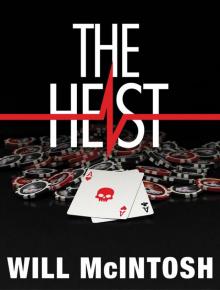 The Heist
The Heist Faller
Faller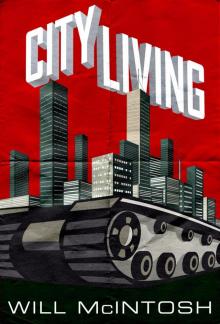 City Living
City Living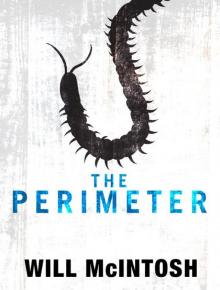 The Perimeter
The Perimeter Watchdog
Watchdog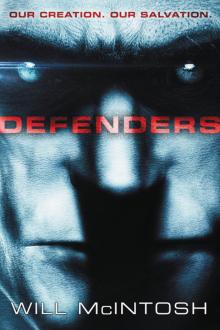 Defenders
Defenders Soft Apocalypse
Soft Apocalypse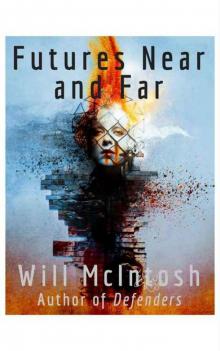 Futures Near and Far
Futures Near and Far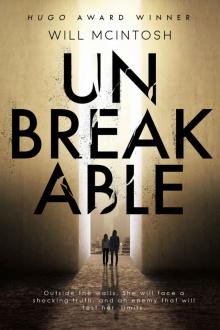 Unbreakable
Unbreakable The Future Will Be BS Free
The Future Will Be BS Free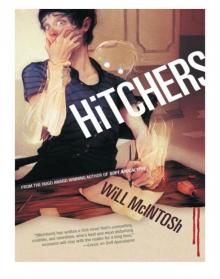 Hitchers
Hitchers Burning Midnight
Burning Midnight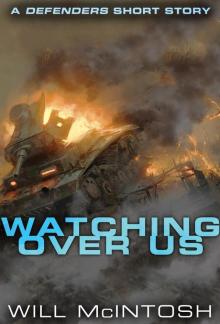 Watching Over Us
Watching Over Us